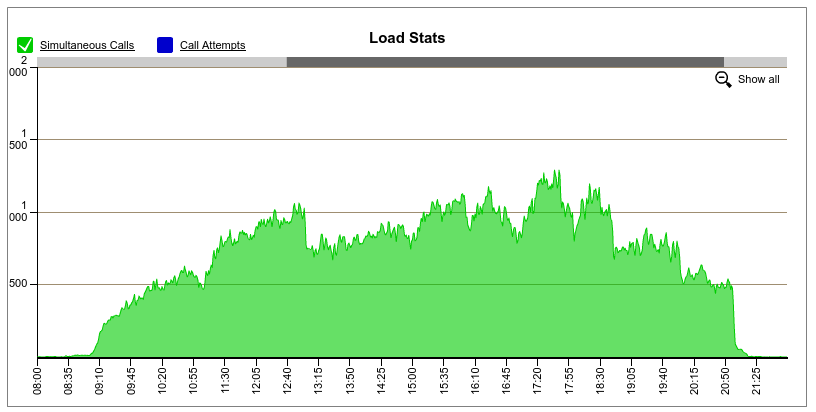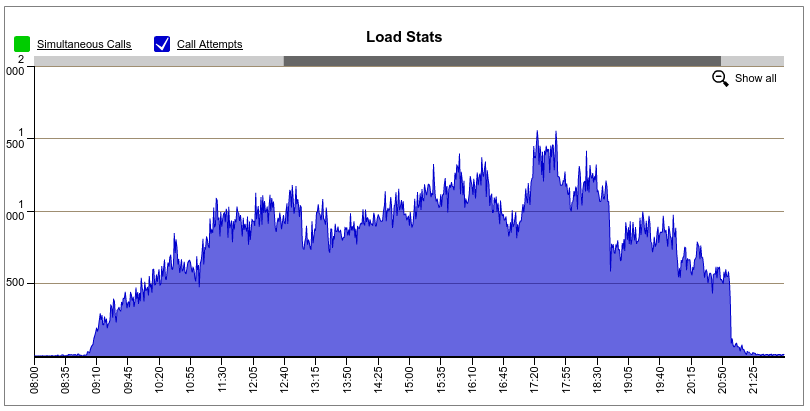Difference between revisions of "Softswitch performance"
From Kolmisoft Wiki
Jump to navigationJump to search
| (101 intermediate revisions by 7 users not shown) | |||
| Line 1: | Line 1: | ||
The system performance in ideal conditions (no extensive GUI usage and no transcoding): | |||
* MOR single-server solution - up to 500 concurrent calls, up to 50 CPS (most of the time it's closer to 20). | |||
* MOR [[Implementations | multi-server solution]] - up to 2000 concurrent calls, up to 100 CPS (most of the time it's closer to 60). | |||
* M4 single-server solution - up to 500 concurrent calls, up to 100 CPS | |||
* M4 [[M4_System_Architecture | multi-server solution]]- up to 10 000 concurrent calls, up to 1000 CPS. | |||
<br> | |||
== Factors that influence softswitch performance == | |||
* [[Recommended_hardware_for_MOR_server | Hardware specifications]] (CPU, RAM, HDD type - 5400/7200 rpm, SSD, SAS, Raid, NIC etc.) | |||
* Network (routers/switches) | |||
* Providers (connectivity, quality, PDD) | |||
* CPS (if you accept a lot of short calls at the same time (so called dialer or call center traffic), softswitch performance decreases) | |||
* Structure of call (signalling only or signalling with media) | |||
* Processes, running on the same time (if you generate invoices, statistics or run other processes, softswitch performance decreases) | |||
* Additional functionality usage (if you record calls, use different IVR structures, softswitch performance decreases) | |||
* Codec and protocol used | |||
* Protocol and codec conversion (in case of transcoding performance decreases two times) | |||
* Calls length (if you accept a lot of short calls at the same time (so called dialer or call center traffic), softswitch performance decreases) | |||
* DB and GUI on same server or on the separate (if you separate DB and GUI, you can increase performance) | |||
* SIP balancer present or not (if you use SIP balancer in front of the servers, you can increase performance) | |||
* Business model (Calling Card, Callback and Call Center calls decreases softswitch performance) | |||
* etc | |||
<br> | |||
See also: [http://blog.kolmisoft.com/how-do-you-select-a-softswitch-based-on-concurrent-calls/ How do you select a softswitch based on concurrent calls?] | |||
<br> | |||
== Screenshots from real use cases == | |||
In all of the below examples, companies were using [[Recommended_hardware_for_MOR_server | recommended hardware]]. | |||
=== MOR, single server solution, Wholesale Transit business === | |||
'''Implementation''': single server with 24 cores, GUI is not used almost at all. | |||
'''Results''': up to 500 concurrent calls, up to 1500 call attempts per minute. | |||
[[File:8.png]] | |||
[[ | |||
[[File:9.png]] | |||
<br><br> | |||
=== MOR, 4-servers solution, Wholesale Transit business === | |||
'''Implementation''': [[SIP_balancer | SIP balancer]], 3 Asterisk (MOR) servers and DB/GUI server. | |||
'''Results''': 1200 concurrent calls, 1500 call attempts per minute. | |||
[[File:115_Load_Stats.png]] | |||
[[File:115_Load_Statsatm.png]] | |||
<br><br> | <br><br> | ||
==See also== | |||
* [[CPS_Limit | CPS Limit]] | |||
* [[Recommended_hardware_for_MOR_server | Recommended hardware]] | |||
* [http://blog.kolmisoft.com/how-do-you-select-a-softswitch-based-on-concurrent-calls/ How do you select a softswitch based on concurrent calls?] | |||
* [[Performance Suggestions]] | |||
Latest revision as of 08:24, 10 April 2025
The system performance in ideal conditions (no extensive GUI usage and no transcoding):
- MOR single-server solution - up to 500 concurrent calls, up to 50 CPS (most of the time it's closer to 20).
- MOR multi-server solution - up to 2000 concurrent calls, up to 100 CPS (most of the time it's closer to 60).
- M4 single-server solution - up to 500 concurrent calls, up to 100 CPS
- M4 multi-server solution- up to 10 000 concurrent calls, up to 1000 CPS.
Factors that influence softswitch performance
- Hardware specifications (CPU, RAM, HDD type - 5400/7200 rpm, SSD, SAS, Raid, NIC etc.)
- Network (routers/switches)
- Providers (connectivity, quality, PDD)
- CPS (if you accept a lot of short calls at the same time (so called dialer or call center traffic), softswitch performance decreases)
- Structure of call (signalling only or signalling with media)
- Processes, running on the same time (if you generate invoices, statistics or run other processes, softswitch performance decreases)
- Additional functionality usage (if you record calls, use different IVR structures, softswitch performance decreases)
- Codec and protocol used
- Protocol and codec conversion (in case of transcoding performance decreases two times)
- Calls length (if you accept a lot of short calls at the same time (so called dialer or call center traffic), softswitch performance decreases)
- DB and GUI on same server or on the separate (if you separate DB and GUI, you can increase performance)
- SIP balancer present or not (if you use SIP balancer in front of the servers, you can increase performance)
- Business model (Calling Card, Callback and Call Center calls decreases softswitch performance)
- etc
See also: How do you select a softswitch based on concurrent calls?
Screenshots from real use cases
In all of the below examples, companies were using recommended hardware.
MOR, single server solution, Wholesale Transit business
Implementation: single server with 24 cores, GUI is not used almost at all.
Results: up to 500 concurrent calls, up to 1500 call attempts per minute.
MOR, 4-servers solution, Wholesale Transit business
Implementation: SIP balancer, 3 Asterisk (MOR) servers and DB/GUI server.
Results: 1200 concurrent calls, 1500 call attempts per minute.




